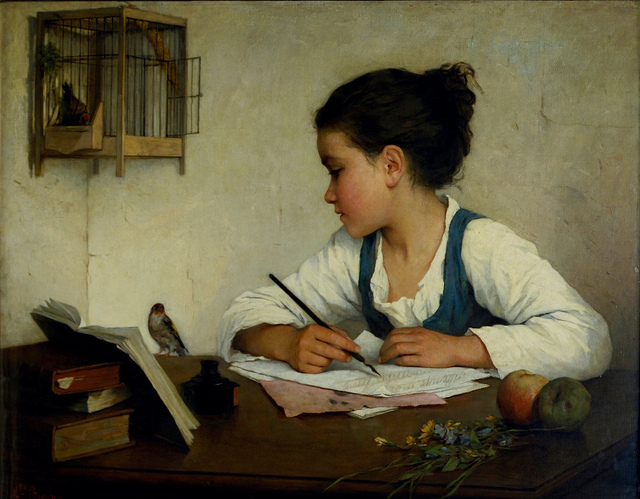I walked into TJ’s first grade class to pick him up for his speech-language therapy session.

“Come take a look, Ms. Callender,” said his teacher.
“Show Ms. Callender what you’ve done!”
As I walked toward his desk, a look of uncertainty flitted across TJ’s face… quickly replaced by a look of accomplishment.
Once I stopped at his desk, he timidly pushed the book toward me.
There on the page of his journal were a bunch of letters – upper and lower case thrown in anywhere.
With hardly any space between them, the script looked like one long jumble of a word.
“Good job, TJ!”
He had written his name… the first time he had put anything on a page during journal writing.
After our therapy session, Ms. Beez, the teaching assistant for TJ’s class came to chat with me.
“What do you make of that boy?”
“What do you mean?”
“He’s lazy, and when I speak to him, he stares at me and does not respond.”
“He’s not lazy. He has some developmental delays.”
“You’re always making EXCUSES for your children!”
Poor TJ!
One of TJ’s problems is visual motor processing difficulty. Children like him are often thought to be lazy.
Visual Motor Processing is the 4th Visual Processing skill we are examining this week.
So far, we have talked about visual discrimination, visual figure-ground discrimination, and visual sequencing.
So what is visual motor processing?
It is the ability to use feedback from the eyes to control and coordinate movement of other body parts.
The last time you wrote your name? Did you have to think about how to form each letter or when to stop and make a space between your names?
Many times, children who are challenged in this area are not identified until they enter elementary school. But you don’t have to wait until then. You can check to see whether your child struggles in this area.
Look for these occurrences:
- Reversals in written letters or numbers (younger children)
- Printing instead of using cursive (older children)
- Copies poorly from books and the board
- Poor spacing of words in a sentence
- Laborious writing—takes a long time to complete an assignment
- Good orally, but written work is poor
Here’s an informal way to determine if your child is having difficulty with visual motor processing.
- Give him a sheet of paper
- Tell him to write the alphabet using lower case letters
- Observe what he is doing but DO NOT CORRECT him
- See if he makes any letters from bottom-to-top (this is a vertical reversal)
- Check whether he has difficulty remembering the next letter to write and sometimes has to begin from “A” or has to sing the alphabet song
- Look for a mixture of lower- and upper-case letters
- Watch the direction of letter “O” formation (clockwise or anti-clockwise)
- Take notes about everything you observe
Some Cautions:
- Limit writing tasks, like spelling words written 5 times. The child will be focusing on remembering how to form the letters rather than how to spell the word.
- Eliminate copying work until the problem is corrected. Writing is extremely stressful for these children.
- Reduce writing until the problem is reversed
You may try this rehabilitation method that was created by Dr. Geteman, and Dr. Paul Dennison:
- Get a large piece of construction paper or chart paper
- Draw a sideways eight on it
- Have the child sit directly in the middle of the eight and trace it for as many times as he can, until he tires
- Increase the number of times he traces as his improves
- Do this four times per week for 6 months.
Children who struggle with visual motor processing difficulties have trouble learning through writing.
However, this does not have to be a life sentence.
With diligence, commitment, discipline and perseverance you can help your child overcome this problem and be a successful learner.
What inconsistencies have you noticed in your child’s writing?


Hi Florence, so glad I got to stop by your blog today from UBC. I loved this post and the combination of your personal story with the academic information. What a valuable tool for parents who’s kids are struggling. The practical tools for assessing your child are brilliant. I also love seeing moms like you advocating for their kids. You rock!!!
Thanks, Minette. I’d like to light a fire under every mom who has a child that is struggling. If only I could (sigh)!
In my experience, a lot of children are “marked” as lazy when they truly have development issues. I commend you for understanding this child’s situation and working with him.
Visiting from the UBC.
Thanks, Stacey. My heart breaks so many times each day, as I observe the difficulties students have and the attitude of most adults around them. I wish I could do more.
That makes me so sad that a teacher would just label a child as lazy! I homeschooled my first son because he had such trouble learning to associate the letters with their sounds. It wasn’t until 6th grade that he was finally diagnosed with Auditory Processing disorder. Because of the strong phonics we worked on (using a book I can’t remember the name of) for the first couple years and then Phonics Pathways (I loved it!), he is able to spell phonetically and you can always tell what he means even if the word is spelled horribly wrong. Not even the Lindamood Bell program brought lasting improvement, but he did well enough to make it through college and be employable with a good job! My other son was unique – in third grade he had a notebook full of beautiful cursive notes taken off the board in a science class, but he wasn’t dong well in the class. Turned out he couldn’t read cursive. He had no idea what he’d copied so beautifully. The brain is a marvelous and amazing thing! Thanks for advocating for kids who aren’t lazy or stupid, they just learn a bit differently.
Thanks for taking the time to stop here and read. I appreciate you.
When my daughter was in the 2nd grade, her teacher wanted to retain her because she was struggling to read and was way below her grade level. That began my search into the world of struggling readers and my discovery of dyslexia. Thanks to the many programs I found and implemented, she is now at the top of her 12th grade class, and the recognized leader in her small private school.
These children have amazing talents, which go unnoticed because they have difficulty ready. If only we would let fish swim instead of asking them to climb trees!